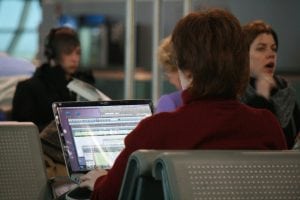Skift Take
Data security is a complicated issue for companies, and it's only getting more complicated as threats mount around the world. Hopefully, last year's laptop ban acts as a wake-up call for businesses that haven't paid attention to the security risks of business travel.
 Nearly a year after laptops were banned in the cabin on dozens of flights entering the U.S. and UK, businesses are still playing catch up on data security.
Nearly a year after laptops were banned in the cabin on dozens of flights entering the U.S. and UK, businesses are still playing catch up on data security.
This week we took a look at how corporate data security policies have evolved over the last year. In an age of constant hacking attempts and inconsistent guidance from government agencies, comprehensive policies are still a work in progress.
Many organizations are still at risk, mostly due to uncertainty surrounding the level of vigilance required for business travelers. Some companies are looking to keep sensitive documents off of employee laptops altogether, for instance, to reduce the number of ways data can be illegally accessed.
It’s a complicated issue that has no end in sight. We’ve also got the latest on business travel and distribution trends from across the industry below.
If you have any feedback about the newsletter or tips, feel free to reach out via email at [email protected] or tweet me @sheivach.
— Andrew Sheivachman, Business Travel Editor
Airlines, Tech, and distribution
Data Privacy Is a Bigger Issue Than Ever for Business Travelers: With laws in flux and hackers prowling for access, companies are trying to help corporate travelers protect valuable business data, but the efforts are piecemeal and inconsistent. Attempts to require loaner devices or limit access to information risk making international travel less productive.
Hilton’s Loyalty Upgrades Are Good News for Frequent Travelers: Elite members of Hilton’s Honors program will soon see some significant upgrades. Marriott and Starwood should take notice.
One Fallout From Long-Haul Battle on Airfares: No Free Checked Bag: Low-fare airlines got there first. Now, big carriers are launching basic economy fares across the Atlantic. Expect some confusion as their customers figure out the rules.
Event Security Takes on Fresh Importance for Meeting Planners: The meeting and event industry is still working to figure out a better approach to security. For the time being, safety should be the priority for planners as they look to stage new events, even if a destination doesn’t seem particularly risky.
India’s Ola Enters Competitive Australian Ground Transport Market: India’s Ola has started operations in two major Australian cities, following hot on the heels of Estonia’s Taxify. The newcomers are exploiting opportunities unlocked when Uber paved the way for increased competition in a market in the tight grip of taxi operators.
The Future of Travel
Airbnb Plus’ Risky Bet to Push Homesharing to a New Level: If Airbnb is successful with Airbnb Plus, it will ensure that alternative accommodations are no longer seen as an alternative. But making it a success will be easier said than done.
Travel Companies Face a Trust Deficit Unless They Reset Use of Customer Data: An established order can only endure if it can take in outsiders. Rome fell to the barbarians, while the British upper class has assimilated celebrities and immigrants. Travel sellers like Google and TUI must absorb new technologies like blockchain or else they will die.
French Rail Workers Set to Strike and Disrupt Intercity Train Service: For travelers, the ugliest French word is gréve, or strike. But like it or not, France’s largest rail union will be striking over the next few months to challenge proposed labor law changes. Mon Dieu!
SUBSCRIBE
Skift Business Travel Editor Andrew Sheivachman [[email protected]] curates the Skift Corporate Travel Innovation Report. Skift emails the newsletter every Thursday.
Subscribe to Skift’s Free Corporate Travel Innovation Report
The Daily Newsletter
Our daily coverage of the global travel industry. Written by editors and analysts from across Skift’s brands.
Have a confidential tip for Skift? Get in touch
Tags: business travel, corporate travel, ctir, laptop ban, security
Photo credit: An airport security employee at a U.S. airport. Companies are still grappling with the challenge of developing data security protocols for business travelers. Bloomberg
